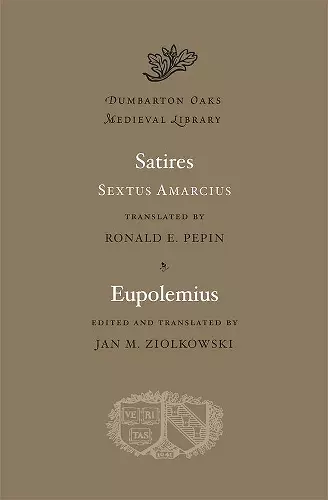Satires. Eupolemius
Sextus Amarcius author Ronald E Pepin translator Jan M Ziolkowski editor
Format:Hardback
Publisher:Harvard University Press
Published:21st Dec '11
Currently unavailable, and unfortunately no date known when it will be back

Composed in Germany by a monastic poet steeped in classical lore and letters, the Satires of Amarcius (Sextus Amarcius Gallus Piosistratus) unrelentingly attack both secular vices and ecclesiastical abuses of the late eleventh century. The verses echo Horace and Prudentius, are laced with proverbs and polemic, and portray vividly aspects of contemporary life—the foppery of young nobles, the vainglory of the nouveaux riches, the fastidiousness of debauched gluttons. This is the first English translation of the Satires.
The Eupolemius is a late-eleventh-century Latin epic that recasts salvation history, from Lucifer’s fall through Christ’s resurrection. The poem fuses Greek and Hebrew components within a uniquely medieval framework. At once biblical, heroic, and allegorical, it complements the so-called Bible epics in Latin from late antiquity and the refashionings of biblical narrative in Old English verse. It emulates classical Latin epics by Virgil, Lucan, and Statius and responds creatively to the foundational personification allegory by the Christian poet Prudentius. The poem was composed by an anonymous German monk, possibly the author who used the pseudonym Amarcius. Although it focuses on events of both the Hebrew Bible and New Testament, it is also rooted in its own momentous times.
This ninth volume of the Dumbarton Oaks Medieval Library, taken as a whole, offers a fascinating glimpse at the intellectual and literary accomplishment of German monastic culture in the eleventh century. Both of the texts in the volume contain a multiplicity of styles, topics, and interpretive practices; they look back to the ‘platinum Latin’ of late antiquity and the early Middle Ages as much as they look forward to the combination of humanistic learning and contemporary concerns. We are lucky to have these texts available with introductions, notes, and translations in a handsome and affordable volume… One exciting aspect of the Dumbarton Oaks Medieval Library is its promise to redefine ‘obscurity.’…This new series has the potential to enlarge the broader scholarly conversation by making fascinating and little-studied works like these known and accessible to non-specialists. Ronald Pepin and Jan Ziolkwoski are to be thanked for contributing to this goal. -- Jonathan Newman * Medieval Review *
ISBN: 9780674060029
Dimensions: 203mm x 133mm x 28mm
Weight: 567g
448 pages